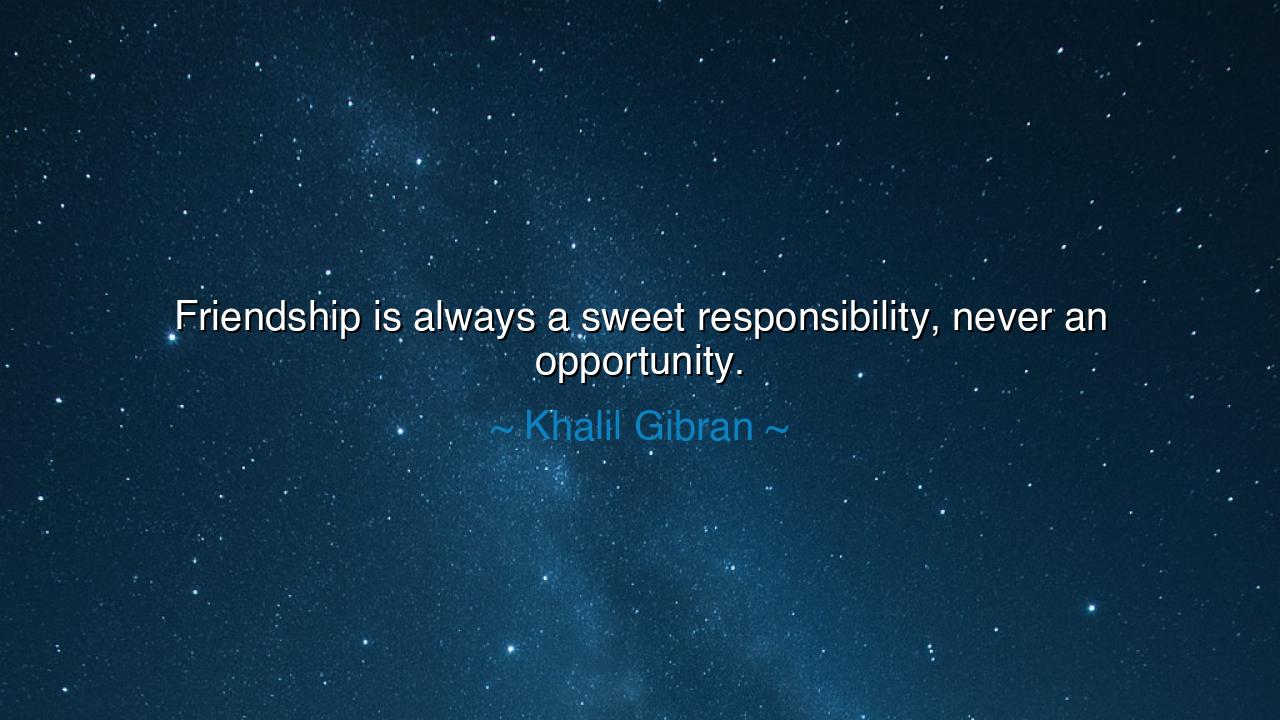
Friendship is always a sweet responsibility, never an






Khalil Gibran, the poet of the soul and the voice of timeless wisdom, once wrote: “Friendship is always a sweet responsibility, never an opportunity.” In this single line, he distilled the essence of noble companionship — that friendship is not a transaction of gain, but a sacred duty of the heart. It is sweet, because it flows from love, care, and mutual respect; and it is a responsibility, because it asks of us not convenience, but constancy — not self-interest, but devotion. To Gibran, friendship was a divine covenant, not a stepping stone toward personal advantage. In his world of luminous thought, every bond was a thread of light connecting souls, and the true friend was both servant and guardian of that light.
The origin of this teaching lies deep within Gibran’s vision of human relationships, shaped by both the mysticism of the East and the longing of exile. Born in Lebanon and living much of his life in the West, Gibran knew both connection and isolation. He saw how easily people used one another — how the name of friendship was often invoked for personal gain, for favor, or for comfort. Thus he wrote these words as a gentle rebuke and a reminder: that to call someone “friend” is not to claim a benefit, but to accept a burden of care — one that is joyous, but also weighty. A sweet responsibility is the kind that asks something of us, but gives more than it takes.
To understand this truth, one might recall the story of Damon and Pythias, the ancient brothers of spirit from the land of Greece. Pythias was condemned to death by a tyrant but wished to bid farewell to his family. His friend Damon offered himself as hostage until Pythias returned. The tyrant, thinking no man would risk his life for another, was astonished when Pythias came back at the appointed hour, ready to die in his friend’s stead. Seeing their loyalty, the tyrant pardoned them both. In their friendship, there was no opportunity — no self-interest, no bargaining. There was only responsibility — a love so pure that each was willing to die for the other. This, Gibran would say, is the highest form of friendship: when the heart finds joy in serving, not in taking.
The word sweet in Gibran’s saying is not mere decoration. It points to the paradox of love — that what is given freely, even when it costs us, becomes a delight to the giver. The duties of friendship — to listen, to forgive, to comfort, to stand by — are not burdens to be resented, but blessings to be embraced. They refine the soul, teaching humility and tenderness. When we serve a friend not because we must, but because we wish to, we partake in the divine rhythm of giving. For love, when selfless, always tastes of honey.
But when friendship is treated as an opportunity — a means to power, pleasure, or gain — it loses its sacredness and decays into mere alliance. The opportunist does not love the person, but the benefit; and when the benefit fades, so too does their loyalty. Such friendships are like shallow wells — they dry up when the season of plenty ends. True friendship, by contrast, endures through storm and drought, because its roots draw not from circumstance, but from responsibility — from the quiet choice to care, again and again, without demand for return.
In every age, this teaching has been tested. Even in our time, when connections are swift and fleeting, when friendship is often measured by what it provides, Gibran’s words strike with prophetic truth. To be a friend is to take up a gentle duty — to see another’s pain as partly your own, to protect their name in absence, to rejoice in their success without envy, to speak truth even when it wounds. This is not a role of advantage, but of service — and yet, it is this service that ennobles the heart.
Therefore, let this be your lesson: seek not friends for profit, but for purpose. Let your loyalty be steady, your affection without calculation. Ask not, “What can this bond bring me?” but rather, “What can I bring to it?” Be patient when your friend falters, generous when they are in need, and humble when they rise above you. For friendship is a sacred stewardship — and to fulfill it well is among life’s greatest honors.
So, when you hear the word friendship, remember Gibran’s wisdom: it is not a key to doors of advantage, but a candle lit in the house of the heart. Keep that flame bright with care, and it will light your way through every darkness. For the one who loves without seeking reward carries the sweetest responsibility of all — the joy of being truly human.






AAdministratorAdministrator
Welcome, honored guests. Please leave a comment, we will respond soon